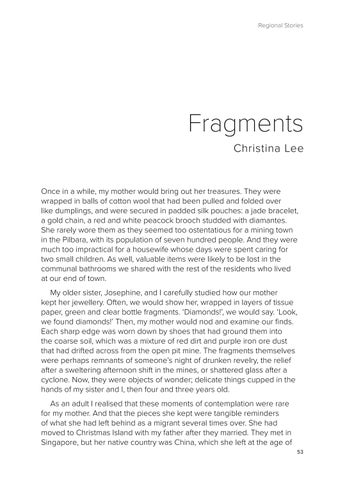Regional Stories
Fragments Christina Lee
Once in a while, my mother would bring out her treasures. They were wrapped in balls of cotton wool that had been pulled and folded over like dumplings, and were secured in padded silk pouches: a jade bracelet, a gold chain, a red and white peacock brooch studded with diamantes. She rarely wore them as they seemed too ostentatious for a mining town in the Pilbara, with its population of seven hundred people. And they were much too impractical for a housewife whose days were spent caring for two small children. As well, valuable items were likely to be lost in the communal bathrooms we shared with the rest of the residents who lived at our end of town. My older sister, Josephine, and I carefully studied how our mother kept her jewellery. Often, we would show her, wrapped in layers of tissue paper, green and clear bottle fragments. ‘Diamonds!’, we would say. ‘Look, we found diamonds!’ Then, my mother would nod and examine our finds. Each sharp edge was worn down by shoes that had ground them into the coarse soil, which was a mixture of red dirt and purple iron ore dust that had drifted across from the open pit mine. The fragments themselves were perhaps remnants of someone’s night of drunken revelry, the relief after a sweltering afternoon shift in the mines, or shattered glass after a cyclone. Now, they were objects of wonder; delicate things cupped in the hands of my sister and I, then four and three years old. As an adult I realised that these moments of contemplation were rare for my mother. And that the pieces she kept were tangible reminders of what she had left behind as a migrant several times over. She had moved to Christmas Island with my father after they married. They met in Singapore, but her native country was China, which she left at the age of 53





















